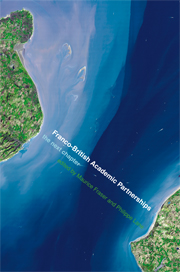Book contents
- Frontmatter
- Contents
- Notes on Contributors
- Foreword by His Excellency Bernard Emié
- Foreword by Sir Peter Westmacott
- Preface
- Part I Teaching and Training Partnerships
- Part II Research Partnerships
- 12 Franco-British Academic Partnership: Perspective from Imperial College London
- 13 Sorbonne University's Franco-British Partnerships
- 14 The École Pratique des Hautes Études (EPHE), Paris: Research Collaboration Between Britain and France
- 15 International University Partnerships and the Role of the French Connection: The Experience of a London College
- 16 Maison Française d'Oxford: A Hub of Academic Cooperation for the Humanities and Social Sciences in Oxford
- 17 Multicultural London English/Multicultural Paris French
- 18 Franco-British Cooperation in the Social Sciences During a Period of Structural Reform: Current Positions and Prospects
- 19 The Publishing Industry and Research Perspectives
- Part III Broader Perspectives
- Appendices: Addresses and Speeches at the Franco-British Academic Partnerships Seminar, French Institute, London, 5 February 2010
- Index
19 - The Publishing Industry and Research Perspectives
from Part II - Research Partnerships
- Frontmatter
- Contents
- Notes on Contributors
- Foreword by His Excellency Bernard Emié
- Foreword by Sir Peter Westmacott
- Preface
- Part I Teaching and Training Partnerships
- Part II Research Partnerships
- 12 Franco-British Academic Partnership: Perspective from Imperial College London
- 13 Sorbonne University's Franco-British Partnerships
- 14 The École Pratique des Hautes Études (EPHE), Paris: Research Collaboration Between Britain and France
- 15 International University Partnerships and the Role of the French Connection: The Experience of a London College
- 16 Maison Française d'Oxford: A Hub of Academic Cooperation for the Humanities and Social Sciences in Oxford
- 17 Multicultural London English/Multicultural Paris French
- 18 Franco-British Cooperation in the Social Sciences During a Period of Structural Reform: Current Positions and Prospects
- 19 The Publishing Industry and Research Perspectives
- Part III Broader Perspectives
- Appendices: Addresses and Speeches at the Franco-British Academic Partnerships Seminar, French Institute, London, 5 February 2010
- Index
Summary
Paris 13 Villetaneuse University was the first to propose a publishing training course; it started in the early 1970s. Organised today with two specialised master's degrees (Editorial Politics and Book Marketing), these training courses are supported in research matters by the Information and Communication Science Laboratory (LABSIC), which dedicates one of its fields of study to the cultural, educational and creative industries. At University College London, the Department of Information Studies delivers training courses (such as an MA in publishing) and leads research work within the CIBER group, on issues such as the use of e-journals in academic sectors, the evolution of e-book practices and the ‘Google generation’ phenomenon. As they have numerous common bases, the two universities have established a research partnership centred on publishing.
Publishing, at least in France, although it has long been studied as part of literary and cultural history, was kept apart from social and economic studies, unlike other cultural sectors (television, cinema, music, media, radio). However, it is now a fully recognised component of the cultural industries, especially since the expansion of digital technologies within the editorial world. However late, France may now – at least in terms of the digital conversion of its book industry, and notably regarding the textbook market – be on an equal footing with the United Kingdom, and the two countries share, with others, the fact that publications are the latest cultural industry to make the digital move.
- Type
- Chapter
- Information
- Franco-British Academic PartnershipsThe Next Chapter, pp. 152 - 156Publisher: Liverpool University PressPrint publication year: 2011



